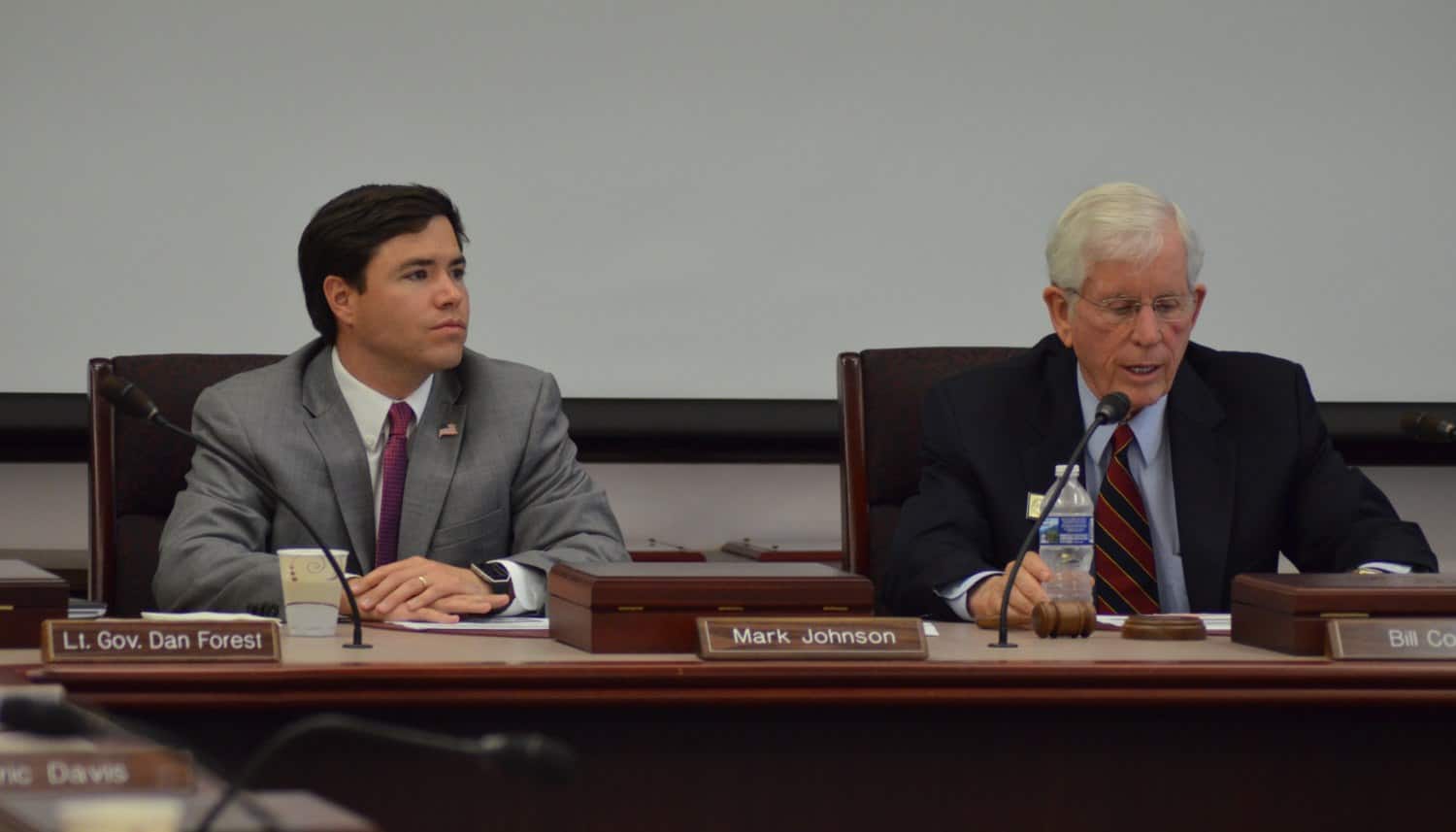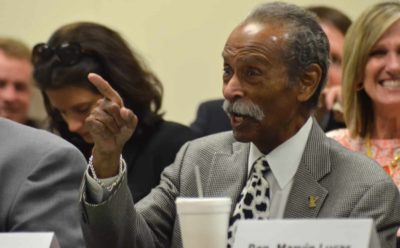While the public waits for the House to unveil a full budget, including its proposal on teacher pay, the portions of the House plan released last week highlight a rift between education leaders in the state.
A provision of the proposed budget would give State Superintendent of Public Instruction Mark Johnson funding to hire 10 positions that would report directly to him and would be exempt from the State Human Resources Act.
When asked about it during the State Board’s Every Student Succeeds Act work session today, Johnson said the reason why he needs those employees in his office is clear.
“I’d refer you to the ongoing court case between me and the State Board,” he said.
Johnson is party to a lawsuit over legislation passed during a special session in December that transferred some of the State Board’s power to the superintendent. That suit will be heard in late June. One of the powers Johnson gains under that legislation, should the legislature’s move stand, pertains to who he can hire and fire. Currently, he is able to give input on some hires but the State Board has the final say.
“I did make that very public affidavit because that kind of sets forth what’s been going on in this department,” he said.
In that affidavit, which is part of the lawsuit, Johnson lists his grievances about the State Board’s hiring process and is critical of the process the board uses to hire for new positions. He lists specific instances where the Board refused to vote on a candidate he recommended, choosing instead to create committees to review potential hires. In the case of the position of chief financial officer, Johnson makes clear in the affidavit that the person the Board ultimately hired is not who he would have chosen.
Johnson has also publicly noted on several occasions that the Board would not let him hire his own chief of staff. In early May, the Board finally gave him the go ahead to hire for that position. At the same meeting, the Board named Maria Pitre-Martin as the new deputy state superintendent. She previously served as chief academic and digital learning officer of the Department of Public Instruction (DPI). At the meeting, Johnson took issue with the process and asked board members not to vote for her appointment.
“No one can argue that my office could use more people to really help to innovate and bring about those big bold ideas that can help us,” Johnson said today.
State Board Chair Bill Cobey, however, disagrees.
“I don’t believe he needs more staff,” Cobey said in an interview today. “He has a whole department that he can call on for various things.”
Cobey also said it is not clear what positions the 10 people would actually hold.
“There is no specificity as to what these people would do,” he said. “He’s got enough people to supervise.”
Both the Senate and House budget proposals include funding to allow Johnson to hire people for his personal staff, but the Senate’s proposal is half that of the House proposal.
Rep. Craig Horn, R-Union, chair of both the education and education appropriations committees in the House, said in an e-mail that the voters of North Carolina chose change when they picked Johnson last November over incumbent candidate June Atkinson.
“It is the opinion of many members of the House that the superintendent should be allowed to staff his leadership team with those of his own choosing rather than having choices thrust upon him,” Horn continued.
Johnson said he is hopeful that the outcome of the court case with the State Board will be decided by the end of the summer. He said that should help clear up the issue of education governance in the state. It is clear that teachers are accountable to principals, principals to superintendents, superintendents to local boards of education, and local boards to the voters, he said. But that all becomes less clear when it comes to higher levels of leadership.
“When you get to Raleigh, there seems to be a lot of finger pointing and dodging of accountability while holding on to responsibility,” he said.
He also said that he has heard the truism that in Raleigh, everyone and nobody is responsible for education.
“And that’s because we have a system that kind of makes it hard to hold people accountable,” he said.
While the House budget gives extra positions to Johnson, it also cuts eight positions from DPI.
- Education Diagnostician I
- Education/Development Aide II
- Education/Development Aide II
- Program Assistant V
- Chief Performance Officer
- Accountant
- Education Consultant II
- Business Technology Analyst
Horn said that most of the positions had been unfilled for some time, and indeed, the budget lists all but one as being vacant. But Cobey said that is not exactly the case. He said at least one additional position has been filled and that some of the other ones aren’t exactly vacant.
“There are back stories behind all these positions,” he said. “They’re not vacant positions in the sense of truly vacant.”
He said that the funding for some of the positions is used to hire contractors when the money is not enough to attract qualified candidates. When he was told what Cobey said about the positions, Horn said the new information could make a difference.
“Since the House budget proposal is VERY different than what the Senate has passed, this provision, I am sure, will be in controversy thereby providing us with the opportunity to not only reconsider but also to amend how we will approach the issue,” he said.
Despite any differences of opinion, Cobey said he is glad that the House did not follow the lead of the Senate with heavy cuts to DPI. The Senate budget plan proposed a 25 percent reduction.
‘“I’m gratified that they didn’t cut the DPI budget,” he said. “I’m very appreciative of that.”



